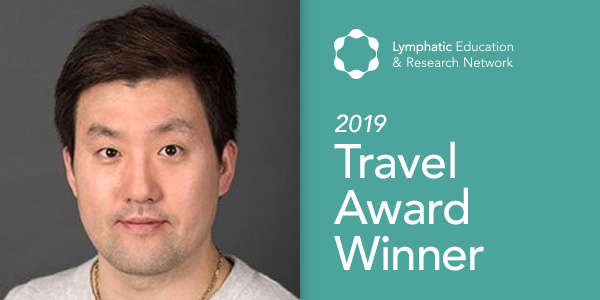Dr. Yang Lee is a research fellow in the Vascular Biology Program at Boston Children’s Hospital and Harvard Medical School. Under the supervision of Hong Chen, Ph.D., Yang received a Travel Award from LE&RN to attend the Lymphatic Forum in Austin, TX. We asked Yang to share his thoughts on that experience and to tell us a bit about his research and future plans.
1. What did you get out of the Lymphatic Forum? Why did you feel it was important to attend?
First, I would like to acknowledge the generous support of LE&RN. The Lymphatic Forum was a very intellectually stimulating meeting that covered a broad range of topics related to the lymphatic system, including developmental biology, physiology, molecular biology, and bioengineering, which ranged from basic to clinical studies. The Lymphatic Forum is one of the few meetings that focuses exclusively on the lymphatic system. At the Forum, I was able to interact with prominent national and international researchers as well as young investigators, physicians, and trainees. During the meeting, I was exposed to the most cutting-edge science in this field. I received excellent comments related to my current project, initiated some new collaborations, and received career advice. So, the Lymphatic Forum provided me with invaluable information on a number of fronts that will help me mature as a scientist.
2. What are your areas of interest in research?
I am interested in adult lymphangiogenesis and how lymphatic function is regulated in physiological and pathological conditions. In particular, I am working on the mechanisms that control lymphangiogenesis and lymphatic function in obesity. As lymphatic dysfunction leads to obesity and obesity exhibits lymphatic functional impairment, I’m investigating whether enhanced lymphangiogenesis and lymphatic function can protect against obesity.
3. What are your hopes and plans for your career and your research?
Because lymphatic dysfunction positively correlates with obese patients, I want to further investigate how this dysfunction aggravates the group of medical conditions known as metabolic syndrome, and conversely, how obesity impairs lymphatic function. These questions are highly clinically-relevant. As I mentioned before, for my postdoctoral training with Dr. Chen, I am studying the regulation of adult lymphangiogenesis and lymphatic function in obesity and other metabolic diseases. My previous training with Dr. Mariappan Muthuchamy at the Texas A&M College of Medicine focused on lymphatic contractility and the molecular mechanisms controlling lymphatic muscle cells in metabolic syndrome and insulin resistance. My near-term career goal is to become an independent academic researcher and continue studying lymphatic biology and metabolic disease. I hope that my current findings can contribute to identifying new therapies for treating human lymphatic diseases.
4. Why do you believe that, in general, lymphatic research is important? What might the field accomplish within the next few years?
The most critical reason for studying this system is that there is no direct treatment for alleviating symptoms of lymphatic diseases. This often-overlooked field is now undergoing a renaissance, as many new discoveries are being published and there are many recently-developed biological tools available to study this important biological system. Over the next few years, I think we will have a vast amount of detailed information that will lead to clinical trials for a number of lymphatic diseases. This eventuality was clearly apparent to me from what I saw at the Lymphatic Forum.
LE&RN programs, like LE&RN Travel Awards, are only possible because of our Partners and Supporting Members. Become a Supporting Member today.

